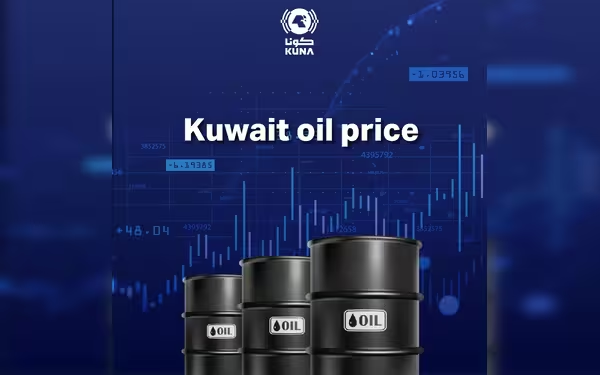Saturday, November 16, 2024 09:44 PM
Kuwait Oil Prices Plummet to USD 74.46 Per Barrel
- Kuwaiti crude oil price drops by USD 3.34.
- OPEC revises oil demand forecasts downward.
- China's crude oil imports decline by three percent.
 Image Credits: menafn
Image Credits: menafnKuwait's oil prices fall to USD 74.46 per barrel amid OPEC demand revisions and declining Chinese imports.
The global oil market is experiencing fluctuations, and recent reports indicate a significant drop in the price of Kuwaiti crude oil. As of October 16, 2023, the price has decreased by USD 3.34, settling at USD 74.46 per barrel. This decline follows a previous trading price of USD 77.80 per barrel on Monday, highlighting the volatility that often characterizes oil prices.
In the broader context of the oil market, Brent crude oil futures have also seen a decrease, falling by USD 3.21 to reach USD 74.25 per barrel. Similarly, West Texas Intermediate (WTI) crude futures dropped by USD 3.25, now priced at USD 70.58 per barrel. These changes reflect a global trend that is influenced by various factors, including supply and demand dynamics.
The Organization of the Petroleum Exporting Countries (OPEC) has provided insights into the current demand for oil. In its latest monthly update, OPEC revised the demand for oil from OPEC+ members downward by 200,000 barrels per day, bringing the total to 43.2 million barrels per day. This figure is still 500,000 barrels more than what was projected for 2024. Furthermore, the demand for OPEC+ crude in 2024 has been adjusted downward by 100,000 barrels per day compared to last month’s estimate, now standing at 42.8 million barrels per day. This represents an increase of 600,000 barrels per day over the 2023 estimate.
China, a significant player in the global oil market, has also reported a decline in its crude oil imports. Official data released on Monday revealed that the country’s crude oil imports for the first nine months of this year fell by approximately three percent compared to the previous year, averaging 10.99 million barrels per day. This decrease in imports may be indicative of changing consumption patterns or economic conditions within the country.
The recent drop in Kuwaiti oil prices and the adjustments in demand forecasts by OPEC reflect the ongoing complexities of the global oil market. As prices fluctuate, it is essential for consumers and businesses alike to stay informed about these changes, as they can have far-reaching implications for economies worldwide. Understanding these trends can help individuals and organizations make better decisions regarding energy consumption and investment in the future.













